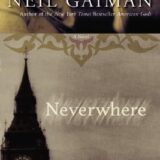
Rainbows End (2006) won the Hugo and Locus Awards for best novel and was nominated for the Prometheus Award.
Robert Gu is recovering from the depths of Alzheimer’s. Once a celebrated poet, advances in medicine mean Robert even functionally regains his youth. The only thing that doesn’t come back is his poetic muse.
What has returned is the mean-spirited personality which delights in damaging others so much that Gu is largely alienated from those he knew before his illness. With relationships tense between Robert and his son’s family, he goes back to school to learn the skills necessary in a world which has changed radically in the decade he has been out of circulation.
Gradually Robert begins to bond with his granddaughter, Miri, a young student, Juan, and to explore new technologies, including the all pervasive electronic networks which have developed from the current internet: Rainbows End is dedicated ‘To the Internet-based cognitive tools that are changing our lives – Wikipedia, Google, eBay, and others of their kind, now and in the future’.
Before this is a prologue in which an EU intelligence agent uncovers a trial of an engineered virus targeted to make people behave in a certain way (in this case buy a particular confectionary) upon viewing a visual trigger (a TV commercial). The implication is either a nation or terrorist group is planning to use the technology to apocalyptic ends – we are told in a casual aside that no major city has been lost to a nuke in 5 years. The probable source of the virus is tracked to a laboratory in San Diego.
Robert was once a professor at the University of San Diego – as was Vernor Vinge when he wrote the novel (he has since retired) – where he becomes involved in a protest against the digitization and destruction of the library. And here Robert’s path intersects with the world of international espionage. Inevitable given his son is a senior Homeland Security officer who when not supervising the defence of America’s western seaboard, is away on covert counter-terrorism missions around the globe. And if that wasn’t enough, Robert’s daughter-in-law regularly has her mind reprogrammed with whatever special JITT (Just In Time Training) is required to save America from the latest international threat.
Central to all this is the enigmatic entity ‘Rabbit’, who may be another identity for one of the main characters in the novel, an AI, or well… and herein lies the major flaw of Rainbows End. Much is made of not knowing who might be behind what persona on-line, so that, as with the online world today, Vinge’s protagonists may ultimately never know what is really going on. Which might be realistic, but which leaves a plot riddled with absurdly improbable coincidences for want of the twist, the revelation, the narrative U-turn, which would tie the disparate yet interconnected narrative threads together in a convincing way. The result is a sprawling, highly imaginative novel in which all the many elements fail to resolve into a satisfying whole. From family drama to techno-thriller, from tragic love story to tale of personal redemption, it collapses into a rabbit shaped hole.
Rainbows End is partly a book about old folks learning new tricks. Given Vinge’s previous novels, such as the superb A Fire Upon The Deep, were immensely satisfying epics of space and time, it seems that here he is trying some new tricks himself. The book is subtitled ‘A Novel With One Foot In The Future’, yet with a trickster ‘Rabbit’ and even a character called Alice, it is also a book with one foot in the past. Of course the previous time we went down this particular metaphorical rabbit hole it was called The Matrix.
There are certainly many intriguing imaginative details in the world Vinge has conceived, and after a two thirds set-up the final third unfolds as an exciting and occasionally moving adventure. Yet it doesn’t convince. There is too much plotting of convenience. The execution of the climatic action seems highly contrived – is it really that easy to gain access to a state-of-the-art biological research lab? – while a major subplot concerning the rivalry between ‘belief circles’ (fans) of competing virtual realities quickly becomes tedious. Rainbows End tells us little more about tomorrow than that if we live long enough we’ll all face future shock, and offers no more insight into the ‘War of Terror’ than the a Hollywood adaptation of a Tom Clancy novel. As for the curious lack of punctuation in the title, you’ll have to read the book. Sad to say there’s no pot of gold awaiting the reader at the end.
*
A slightly different version of this review originally appeared in Vector: The Critical Journal of the British Science Fiction Association (#249)
Previous Award Winners covered in this series of retrospective reviews include Spin by Robert Charles Wilson and Nova Swing by M. John Harrison










